Search titles
Displaying results 11 to 20 of 91.

International Review of Environmental History: Volume 6, Issue 1, 2020 »
Edited by: James Beattie
Publication date: May 2020
International Review of Environmental History takes an interdisciplinary and global approach to environmental history. It encourages scholars to think big and to tackle the challenges of writing environmental histories across different methodologies, nations, and time-scales. The journal embraces interdisciplinary, comparative and transnational methods, while still recognising the importance of locality in understanding these global processes.
The journal's goal is to be read across disciplines, not just within history. It publishes on all thematic and geographic topics of environmental history, but especially encourage articles with perspectives focused on or developed from the southern hemisphere and the ‘global south’.
Download for free
Not available for purchase
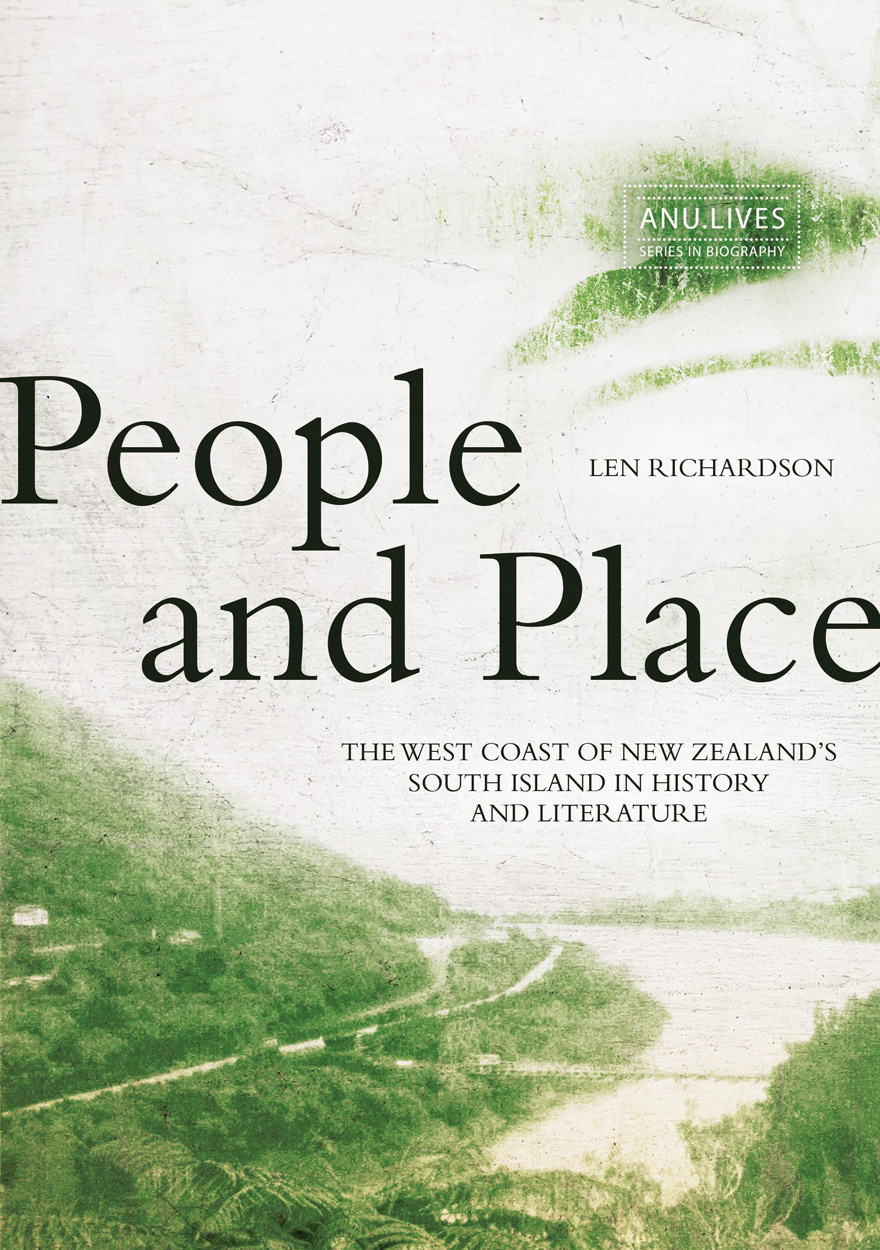
People and Place »
The West Coast of New Zealand’s South Island in History and Literature
Authored by: Len Richardson
Publication date: May 2020
This book traces the enduring relationship between history, people and place that has shaped the character of a single region in a manner perhaps unique within the New Zealand experience. It explores the evolution of a distinctive regional literature that both shaped and was shaped by the physical and historical environment that inspired it. Looking westwards towards Australia and long shut off within New Zealand by the South Island’s rugged Southern Alps, the West Coast was a land of gold, coal and timber. In the 1950s and 1960s, it nurtured a literature that embodied a sense of belonging to an Australasian world and captured the aspirations of New Zealand’s emergent radical nationalism. More recent West Coast writers, observing the hollowing out of their communities, saw in miniature and in advance the growing gulf between city and regional economies aligned to an older economic order losing its relevance. Were they chronicling the last hurrah of a retreating age or crafting a literature of regional resistance?
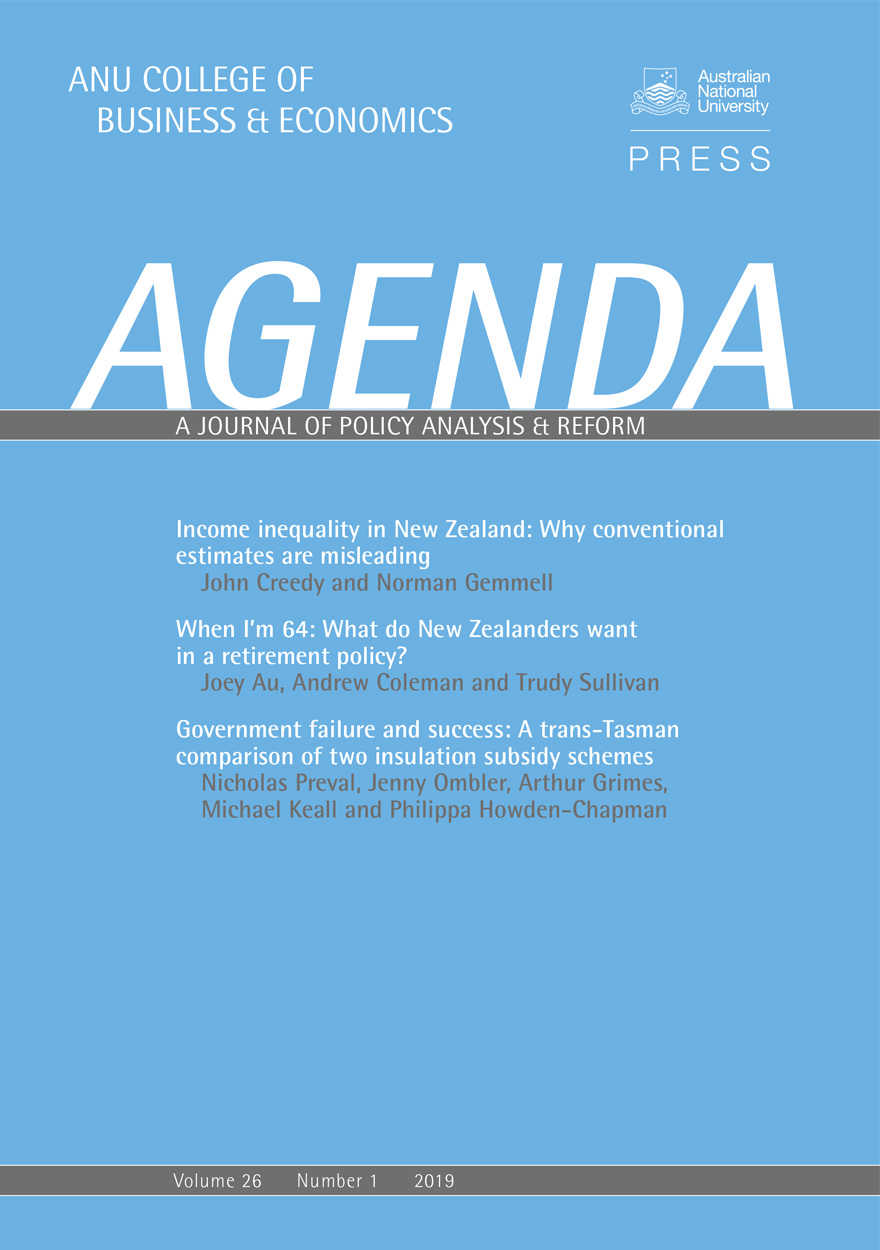
Agenda - A Journal of Policy Analysis and Reform: Volume 26, Number 1, 2019 »
Edited by: William Coleman
Publication date: September 2019
Agenda is a refereed, ECONLIT-indexed and RePEc-listed journal of the College of Business and Economics, The Australian National University. Launched in 1994, Agenda provides a forum for debate on public policy, mainly (but not exclusively) in Australia and New Zealand. It deals largely with economic issues but gives space to social and legal policy and also to the moral and philosophical foundations and implications of policy.
Subscribe to the Agenda Alerting service if you wish to be advised on forthcoming or new issues.
Download for free
Not available for purchase
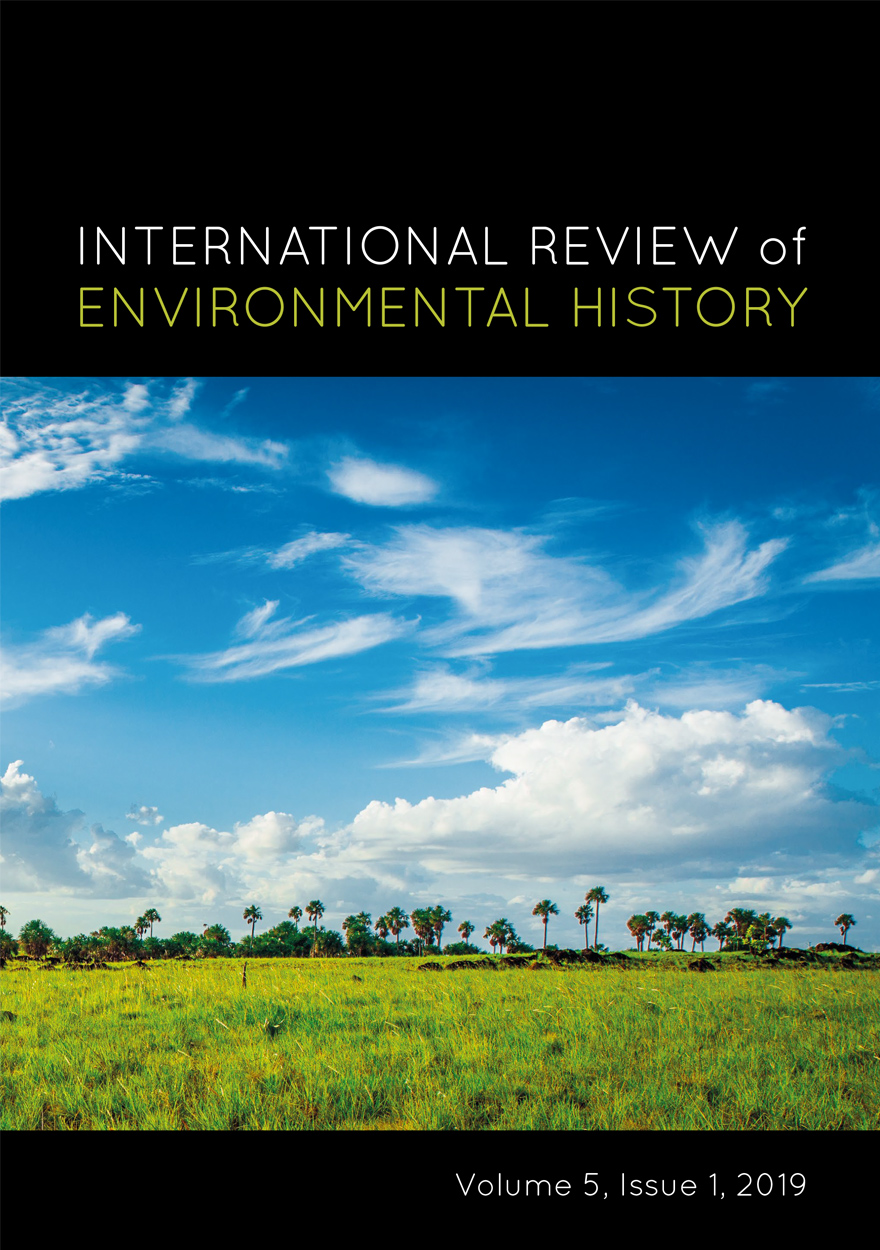
International Review of Environmental History: Volume 5, Issue 1, 2019 »
Edited by: James Beattie
Publication date: May 2019
International Review of Environmental History takes an interdisciplinary and global approach to environmental history. It encourages scholars to think big and to tackle the challenges of writing environmental histories across different methodologies, nations, and time-scales. The journal embraces interdisciplinary, comparative and transnational methods, while still recognising the importance of locality in understanding these global processes.
The journal's goal is to be read across disciplines, not just within history. It publishes on all thematic and geographic topics of environmental history, but especially encourage articles with perspectives focused on or developed from the southern hemisphere and the ‘global south’.
Download for free
Not available for purchase

Successful Public Policy »
Lessons from Australia and New Zealand
Publication date: April 2019
In Australia and New Zealand, many public projects, programs and services perform well. But these cases are consistently underexposed and understudied. We cannot properly ‘see’—let alone recognise and explain—variations in government performance when media, political and academic discourses are saturated with accounts of their shortcomings and failures, but are next to silent on their achievements.
Successful Public Policy: Lessons from Australia and New Zealand helps to turn that tide. It aims to reset the agenda for teaching, research and dialogue on public policy performance. This is done through a series of close-up, in-depth and carefully chosen case study accounts of the genesis and evolution of stand-out public policy achievements, across a range of sectors within Australia and New Zealand. Through these accounts, written by experts from both countries, we engage with the conceptual, methodological and theoretical challenges that have plagued extant research seeking to evaluate, explain and design successful public policy.
Studies of public policy successes are rare—not just in Australia and New Zealand, but the world over. This book is embedded in a broader project exploring policy successes globally; its companion volume, Great Policy Successes (edited by Paul ‘t Hart and Mallory Compton), is published by Oxford University Press (2019).

The Neoliberal State, Recognition and Indigenous Rights »
New paternalism to new imaginings
Edited by: Deirdre Howard-Wagner, Maria Bargh, Isabel Altamirano-Jiménez
Publication date: July 2018
The impact of neoliberal governance on indigenous peoples in liberal settler states may be both enabling and constraining. This book is distinctive in drawing comparisons between three such states—Australia, Canada and New Zealand. In a series of empirically grounded, interpretive micro-studies, it draws out a shared policy coherence, but also exposes idiosyncrasies in the operational dynamics of neoliberal governance both within each state and between them. Read together as a collection, these studies broaden the debate about and the analysis of contemporary government policy.
The individual studies reveal the forms of actually existing neoliberalism that are variegated by historical, geographical and legal contexts and complex state arrangements. At the same time, they present examples of a more nuanced agential, bottom-up indigenous governmentality. Focusing on intense and complex matters of social policy rather than on resource development and land rights, they demonstrate how indigenous actors engage in trying to govern various fields of activity by acting on the conduct and contexts of everyday neoliberal life, and also on the conduct of state and corporate actors.
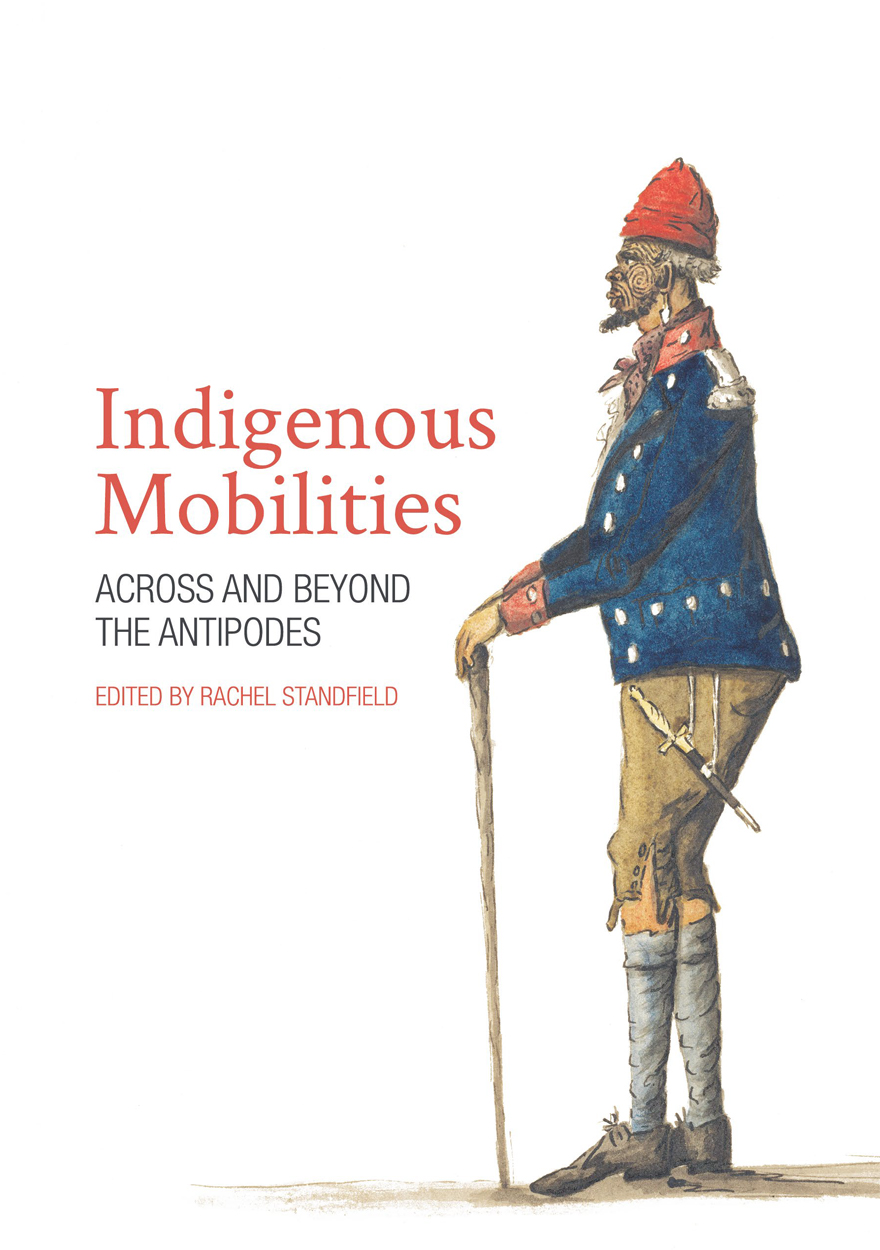
Indigenous Mobilities »
Across and Beyond the Antipodes
Edited by: Rachel Standfield
Publication date: June 2018
This edited collection focuses on Aboriginal and Māori travel in colonial contexts. Authors in this collection examine the ways that Indigenous people moved and their motivations for doing so. Chapters consider the cultural aspects of travel for Indigenous communities on both sides of the Tasman. Contributors examine Indigenous purposes for mobility, including for community and individual economic wellbeing, to meet other Indigenous or non-Indigenous peoples and experience different cultures, and to gather knowledge or experience, or to escape from colonial intrusion.
‘This volume is the first to take up three challenges in histories of Indigenous mobilities. First, it analyses both mobility and emplacement. Challenging stereotypes of Indigenous people as either fixed or mobile, chapters deconstruct issues with ramifications for contemporary politics and analyses of Indigenous society and of rural and national histories. As such, it is a welcome intervention in a wide range of urgent issues. Second, by examining Indigenous peoples in both Australia and New Zealand, this volume is an innovative step in removing the artificial divisions that have arisen from “national” histories. Third, the collection connects the experiences of colonised Indigenous peoples with those of their colonisers, shifting the long-held stereotypes of Indigenous powerlessness. Chapters then convincingly demonstrate the agency of colonised peoples in shaping the actions and the mobility itself of the colonisers.
While the volume overall is aimed at opening up new research questions, and so invites later and even more innovative work, this volume will stand as an important guide to the directions such future work might take.’
— Heather Goodall, Professor Emerita, UTS

Agenda - A Journal of Policy Analysis and Reform: Volume 25, Number 1, 2018 »
Edited by: William Coleman
Publication date: May 2018
Agenda is a refereed, ECONLIT-indexed and RePEc-listed journal of the College of Business and Economics, The Australian National University. Launched in 1994, Agenda provides a forum for debate on public policy, mainly (but not exclusively) in Australia and New Zealand. It deals largely with economic issues but gives space to social and legal policy and also to the moral and philosophical foundations and implications of policy.
Subscribe to the Agenda Alerting service if you wish to be advised on forthcoming or new issues.
Download for free
Not available for purchase

Exploring the Earth under the Sea »
Australian and New Zealand achievements in the first phase of IODP Scientific Ocean Drilling, 2008–2013
Edited by: Neville Exon
Publication date: October 2017
Exploring the Earth under the Sea brings to life the world’s largest and longest-lived geological research program, which has been drilling over many decades at many locations deep below the ocean floor to recover continuous cores of sediment and rock. Study of these materials has helped us understand how the Earth works now, how it has worked in the past and how it may work in the future. The cores are a wonderful source of information on the dynamic processes that form and reform the Earth, both beneath the ocean and on land. The results have revealed climate and oceanographic change on different time frames, the history of life in the sea and on land including global mass extinctions, the extraordinary story of the great masses of ‘extremophile’ microbes that live beneath the sea bed, the nature of the giant earthquakes and tsunami generated at the trenches where tectonic plates collide, and the nature of submarine volcanoes and metalliferous deposits.
This book outlines the technology and enduring international partnerships that underlie the scientific ocean drilling accomplished by the first phase of IODP, currently involving 23 countries. It highlights the important role of Australian and New Zealand scientists in the program, and the great scientific benefits we have derived from our partnership since joining IODP in 2008. As well as the scientific summaries, there are personal accounts by shipboard scientists of how they found life at sea on two-month expeditions, working 12-hour shifts on a noisy drill ship.
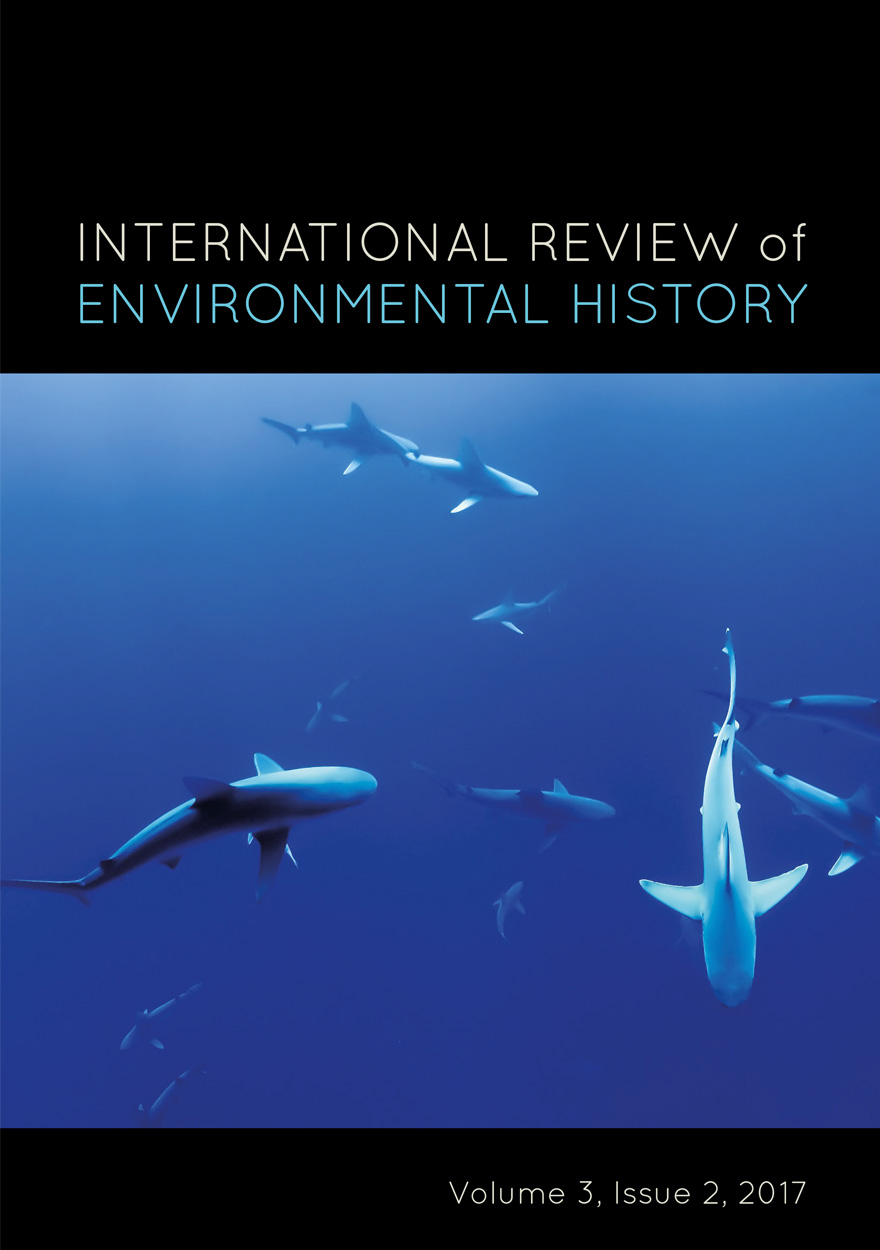
International Review of Environmental History: Volume 3, Issue 2, 2017 »
Edited by: James Beattie
Publication date: October 2017
International Review of Environmental History takes an interdisciplinary and global approach to environmental history. It encourages scholars to think big and to tackle the challenges of writing environmental histories across different methodologies, nations, and time-scales. The journal embraces interdisciplinary, comparative and transnational methods, while still recognising the importance of locality in understanding these global processes.
The journal’s goal is to be read across disciplines, not just within history. It publishes on all thematic and geographic topics of environmental history, but especially encourage articles with perspectives focused on or developed from the southern hemisphere and the ‘global south’.
Download for free
Not available for purchase



